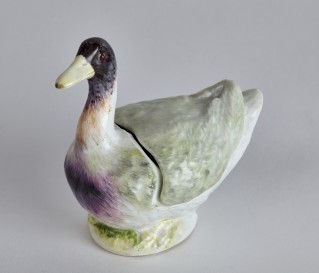Duck-shaped butter dish
- Date
- 2nd half of the 18th century
- Object type
- dish
- Technique
- underglaze paint, painting, , firing, modelling
- Material
- porcelain
- Dimensions
- 11.5 x 9.8 x 7.0 cm
- Acquisition date
- 2020
- Location
- Not on display
- Marks and inscriptions
- signed at the bottom, on the unglazed surface, in blue paint, with the mark of two crossed swords
- Place of Origin
- Meissen (Germany)
- Owner
- The Royal Łazienki
- Acquisition name
- purchased
- Museum number
- ŁKr 1501
This small porcelain duck looks like a toy, but it is not, nor is it a trinket that
can be placed on a shelf or a mantelpiece. It is a container used to store butter. Butter dishes in the shape of birds, which were both modelled and painted in a naturalistic manner, were popular and highly sought after pieces of eighteenth-century tableware. These type of dishes and also porcelain figurines were used in sets or in pairs as tableware – in this case a duck and drake. The butter dish, depicting a drake, consists of a container in the body of the duck and a lid formed from the wings. It was produced by the famous Meissen porcelain manufactory and the German sculptor Johann Joachim Kändler, the chief model maker at Meissen, is considered to be the author of the first such containers.[A.Czarnecka]













